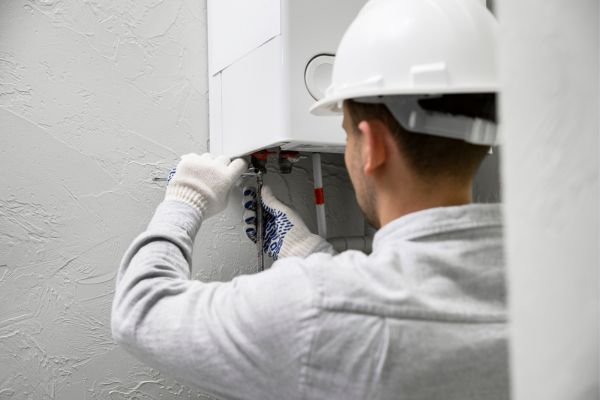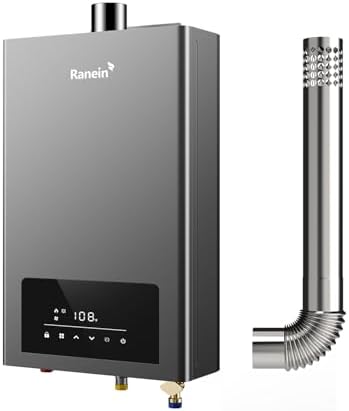If you’ve ever experienced a power outage, one of the first questions you might ask is, “Will my water heater still work?” The answer largely depends on the type of gas water heater you have. While gas water heaters primarily use natural gas or propane to heat water, many models do require some electricity to function fully.
Let’s break down exactly when and why a gas water heater might need electricity—and what that means for your hot water supply during a blackout.
How Gas Water Heaters Work
Gas water heaters use a combination of gas fuel and heating components to warm your home’s water supply.
Key Components of a Gas Water Heater
- Gas burner: Heats the water at the bottom of the tank.
- Thermostat: Regulates water temperature.
- Flue: Vents exhaust gases safely out of the home.
- Pilot light or electronic igniter: Ignites the burner when heat is needed.
The Role of the Pilot Light and Burner
Traditional gas water heaters use a standing pilot light that constantly burns a small flame. When the thermostat senses a drop in water temperature, the gas valve opens, allowing the burner to ignite and heat the water.
This system doesn’t rely on electricity—making it functional even during power outages.

When a Gas Water Heater Uses Electricity
Not all gas water heaters are old-school. Newer, high-efficiency models often include components that require electricity to operate.
Electric Ignition Systems (Electronic Igniters)
Instead of a continuously burning pilot light, many modern gas water heaters use electronic ignition. These systems rely on a spark or hot surface igniter powered by electricity.
- Pro: More energy-efficient (no fuel wasted keeping a flame alive).
- Con: Won’t work without power unless backed up by a battery or generator.
Control Boards and Safety Sensors
Advanced water heaters may have:
- Printed circuit boards (PCBs)
- Thermal cut-off switches
- Flame sensors
- Electronic gas valves
All of these rely on electricity to monitor and control operations safely and efficiently.
READ MORE: How Long Does It Take to Replace a Water Heater?
Power-Vent and Direct-Vent Systems
Gas water heaters with power-venting or direct-vent systems use electric fans to push exhaust fumes outside.
- Without power, the fan won’t run.
- As a safety feature, the heater will not ignite if it can’t properly vent.
Types of Gas Water Heaters and Their Power Needs
Here are the breakdown of various gas water heaters and their relations with electricity:
Traditional Tank-Style Gas Water Heaters
- Standing pilot light models: Do not require electricity.
- Electronic ignition models: Require electricity to start the burner.
Tankless (On-Demand) Gas Water Heaters
- Require electricity for ignition, controls, and sensors.
- No electricity = no hot water.
Even though they heat with gas, they won’t work without power unless you have a battery backup or generator.
Hybrid and High-Efficiency Models
- Most come with control panels, exhaust fans, and igniters.
- These models almost always need continuous electrical power.
Can a Gas Water Heater Work Without Electricity?
Yes—some models can. But it depends on how your water heater starts and vents.
Standing Pilot Models During Power Outages
Older units with standing pilot lights and gravity-venting systems can operate fully without electricity. As long as the gas supply is uninterrupted, these heaters:
- Light the burner automatically via the pilot
- Vent naturally through the flue
- Continue heating water even during blackouts
Limitations of Electric-Ignition Models
If your gas water heater uses an electronic igniter:
- It won’t ignite during a power outage.
- You’ll be without hot water unless your heater has a battery backup or is connected to a generator.
Always check your model specifications to confirm.
READ MORE: How Often to Flush a Water Heater
What Happens to Your Water Heater in a Power Outage?
During a power outage, your access to hot water depends entirely on your water heater’s ignition and venting method.
Will You Still Have Hot Water?
If you have a tank-style gas water heater with a standing pilot light, the answer is generally yes:
- The pilot light continues to burn.
- The burner ignites when needed.
- Hot water remains available even without electricity.
If you have an electronic ignition system or a power-vent model, the answer is no—these require electricity to function, so your heater will not run during a blackout.
Tankless water heaters also require constant electricity. If power goes out, so does your hot water supply—immediately.
Differences Based on Model Type
| Water Heater Type | Needs Electricity? | Works During Power Outage? |
| Standing Pilot Tank Heater | No | Yes |
| Electronic Ignition Tank | Yes | No |
| Tankless Gas Water Heater | Yes | No |
| Power-Vent Tank Heater | Yes | No |
| Hybrid Gas Heater | Yes | No |
Advantages of Gas Water Heaters With and Without Electricity
When selecting a water heater, knowing the trading bands between the models that require electricity and which are not important.
Reliability During Outages
- Standing pilot models shine in emergencies. They work even when the grid goes down, making them perfect for storm-prone areas.
- Electric ignition models are more efficient but vulnerable during outages—unless backed up by a battery-powered igniter or whole-home generator.
Energy Efficiency and Safety
- Electronic igniters don’t burn gas continuously like pilot lights—saving energy.
- Modern models have advanced safety features that monitor performance and prevent gas buildup or overheating.
- However, these benefits come at the cost of needing electricity to function.
Ultimately, it comes down to whether you value off-grid reliability or modern efficiency more.
READ MORE: Free Water Heater Disposal Near Me
Maintenance Tips for Gas Water Heaters With Electric Components
Whether your gas water heater uses electric ignition, vent fans or control boards, it is important to keep those components clean and functional.
Inspecting Igniters and Sensors
- Check igniter electrodes for carbon buildup or corrosion.
- Ensure flame sensors are clean and properly aligned.
- Remove dust from vent fans and air intakes.
Failing sensors or dirty igniters can prevent the heater from firing—even when electricity is available.
Replacing or Resetting Electronic Parts
- If your heater has a control board, check for blinking error codes during malfunctions.
- Reset the unit according to the manual before calling a technician.
- Replace worn components like thermistors, fuse links, or pilot assemblies when needed.
Schedule annual maintenance to extend the lifespan and ensure safety.
Conclusion
So, does a gas water heater need electricity? It depends on the model. Traditional gas heaters with a standing pilot can run without electricity, making them a reliable choice during power outages. On the other hand, modern units—especially those with electronic ignition, control boards, or power venting—require electricity to operate, even though they heat water with gas.
While choosing or maintaining your gas water heater, consider how you want to perform in an emergency and whether you are equipped with backup power when needed. Balancing energy efficiency with peace of mind can help you choose the model that suits your home and lifestyle.
FAQs
1. Does a gas water heater need to be plugged in?
Not always. Older models with standing pilot lights don’t need to be plugged in. However, modern models with electric ignition or power venting usually have a power cord.
2. Will a gas water heater work if the power goes out?
Yes, if it has a standing pilot light. No, if it has an electronic igniter, power vent, or digital controls—unless backed by a generator or battery.
3. Can I use a generator to power my gas water heater?
Yes, many gas water heaters with electric components can be powered using a portable generator during outages. Make sure the wattage is sufficient and connections are safe.
4. What’s the difference between a pilot light and an electric igniter?
A pilot light burns continuously, while an electric igniter creates a spark or heat only when needed. Electric igniters save energy but depend on electricity to function.
5. Is a power-vent gas water heater better than a standard model?
Power-vent models are more efficient and safer in tight spaces, but they require electricity, are more expensive, and may not work during outages without backup power.




